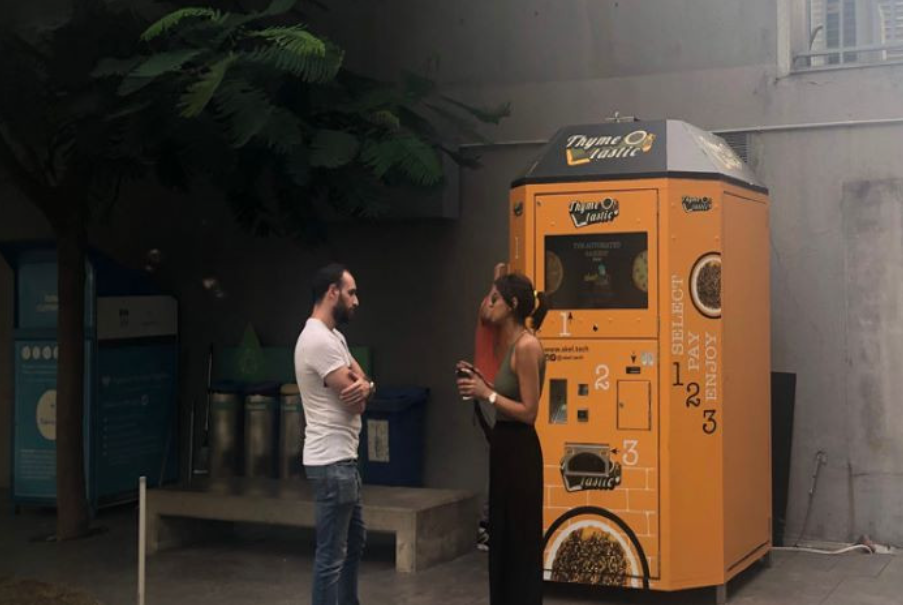Buzzing commotion around the first manoushe vending machine was prevalent at the Beirut Digital District. The brainchild of akeltech, the prototype of the hot foods vending machine made its debut, and the fresh out of the oven manoushe’s rolled out.
The invention comes from a long lineage of engineering and automation. Abed ElKader Jawhar, CEO of akeltech, studied mechanical engineering at AUB and then worked in numerous multinationals in automation. As her pursued his higher degree, his late night MBA courses got him scrambling to grab a healthy bite, later realizing there was no access to healthy food. Vending machines, he found, only dispensed chips and chocolate, which have no nutritional value. Abed ElKader got thinking…
BDD’s team sat with Abed ElKader (AJ) to understand the automation in the food industry, the potential of such a concept and how certain standards can and should be maintained.
BDD: Tell us a bit about the inspiration behind akeltech
AJ: The idea stems from both personal experience, as someone conscious of his weight, diet and nutrition. Late nights in university meant the only access to food was through vending machines on campus. When I conducted market research about the issue, I found that the problem was universal. Lots of people are in need of healthy or high-quality fast food in locations that can’t be accessed by delivery and at random times of day or night.
If you need quality food fast today, you would need to wait for delivery services to arrive, and overpay to hopefully guarantee high-quality food, but you never are assured on hygiene standards in the food preparation process. Given my experience, where I see first-hand the benefits of automation on a daily basis, and my dissatisfaction with my enforced diet, I started my MBA thesis on exploring the opportunity of automating fast food. That was 2 years ago.
BDD: What were the key challenges you faced when setting up the business?
AJ: The key challenge was securing financing for the idea. We couldn’t prove the concept nor our capability without financing. Being a hardware startup, our prototype costs are much higher than the average startup. We also needed a highly experienced team and lots of proof of concept testing for every assembly inside the machine.
Which leads to the second challenge, getting a highly experienced team within budgetary constraints. Luckily, we found a team that believes in our vision and is excited to work on continuous R&D of high tech machinery, here in Lebanon, without having to migrate.
BDD: How do you see the akeltech growing?
AJ: Our prototype just launched in BDD, and is available 24/7. On the first day, we have individuals pulling overnighters visit the machine numerous times.
However, to grow, we are currently seeking for a master franchisee to handle Lebanon’s market, so we could fully deploy machines in Lebanon and test them to be able to go to foreign markets in an aggressive manner.
BDD: How do you control quality, from a hygiene, production and time perspective?
AJ: It’s a very detailed process. From a hygiene perspective, automation is the most hygienic way to prepare food. Removing the human element takes out potential food safety problems such as poor hand washing practices, transmission of foodborne disease and infections spreading between workers.
Just think about it, everything consistent and hygienic you eat or drink daily is done through automation, whether it’s a soda can, bar of chocolate, a ketchup bottle, or a canned tuna. The entire machine is in stainless steel and the components are food-safe ISO accredited materials from Europe.
From a quality perspective, our raw materials are compliant with FSSC 22000 (GFSIscheme), ISO 9001, ISO 22005 and ISO 22000 standards. Thanks to automation, we save on labor costs compared to the traditional way of preparing a manoushe. What we save in labor, we invest in quality. Our manoushe raw material costs are more than double of a manoushe in any bakery across town, yet the manoushe from the machine is priced lower than the market average (an idea of the prices: Zaatar Oat Dough LBP2,000, Cheese White dough LBP3,000). Our suppliers conduct daily labs tests on the raw material and share the reports before we purchase it. All foods are stored in a freezer inside the machine, till the time of the customer order.
And lastly, production is done daily, and the freezer maintains quality and food safety. The high quality ingredients with the freezer allows the shelf life of our products to extend for up to one week. But our business model wouldn’t make sense if products are in the machine for more than 48 hours. In case that ever happens recurrently, we would relocate the machine to a higher traffic location.
BDD: How do you foresee akeltech disrupting the F&B industry?
AJ: We see that akeltech would change the perspective of fast food not being healthy, low quality, not hygienic and barely consistent.
Like what we’ve done with the Automated Bakery (available today in BDD only) that can serve pizzas, manoushes, waffles, crepes, and pretzels, we can develop burgers, shawarma, falafel, fries, sushi and knefe vending machines. We are waiting for our customers to be creative with their requests, and for our future franchisees to do market research in their countries. We can technically develop any kind of vending machine serving any kind of product. The machines are plug and play, and could be installed anywhere.
BDD: How can the insights from the real time monitoring feature be used to enhance businesses?
AJ: Real-time monitoring has many advantages. To name a few:
- It guarantees quality and food safety: the temperature, time of preparation, time of replenishment, of each product is monitored to ensure highest level of quality.
- Insights: We can track sales details (choice, time of order…) to further optimize the food offerings for each location.
- Inventory optimization: Tracking inventory in real time will ensure that the machine is never empty, and would optimize our forecasting for daily production.
- Maintenance: We can know of any malfunction of any machine in real time, and if it was a software problem, we can access the machine directly for troubleshooting.
BDD: What are your upcoming plans to innovate?
AJ: We have a countless innovative ideas when it comes to features, options, food products, payment options and so on. But we are waiting for feedback from our prototype to know which features would directly add value for our customers.
We are relying on our friends and peers at BDD to provide us with timely feedback and recommendations regarding their experience with the machine. We will be adjusting and tweaking the machine and supply chain daily based on their feedback and our live insights.
To get in touch with akeltech: Visit the Instagram page @akel.tech, website, or flat6labs offices.




